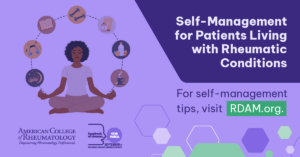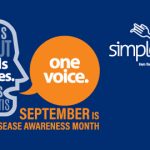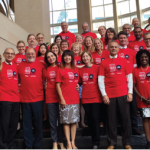 Self-Management Is an Important Puzzle Piece for Patients Living with Rheumatic Disease
Self-Management Is an Important Puzzle Piece for Patients Living with Rheumatic Disease
Rheumatology professionals know that self-management can help patients with rheumatic conditions, but self-management is not as prevalent as it could or should be. This year’s Rheumatic Disease Awareness Month (RDAM), in September, will focus on patient self-management to boost aware¬ness of this important aspect of care.
This year’s theme—self-management for patients living with rheumatic conditions—“is crucial [because] it helps bridge the existing information gap on self-management,” says Bhakti Shah, MD, a rheumatologist with Crystal Run Healthcare, Middletown, N.Y., and a physician spokesperson for this year’s RDAM campaign. Dr. Shah is also a member of ACR’s Communications and Marketing Committee (CMC), which provides medical expertise on various marketing campaigns and resources.
“The campaign seeks to equip our patients with the tools and confidence to play a more engaged role in managing their rheumatic condition, ultimately enhancing their overall treatment experience,” Dr. Shah says.
‘[Self-management] involves patients proactively understanding & learning lifestyle changes & strategies to improve their well-being.’ —Dr. Shah
Dr. Shah believes it’s important to distinguish self-management from self-care because they are not the same. “Self-management is an individual’s day-to-day management of their chronic conditions over the course of an illness. Self-care consists of those tasks performed by healthy people to prevent illness rather than manage an existing illness,” she says.
Within rheumatology, self-management includes working with a healthcare team to develop a comprehensive approach beyond just medication adherence, Dr. Shah notes.
“It involves patients proactively understanding and learning lifestyle changes and strategies to improve their well-being,” she says.
In her own practice, Dr. Shah has observed patients seeking support by joining various groups on social media and having a strong desire to improve their symptoms solely through medical therapies. “I’d like to encourage patients to take a step back and look at their health on a grander scale,” she says.
“Our focus for RDAM this year is on empowering patients living with rheumatic conditions to take charge of their health by incorporating self-management strategies and promoting active collaboration with their rheumatology care teams,” says Mohammad A. Ursani, MD, a community practice rheumatologist in The Woodlands, Texas, and chair of the CMC. “The goal is to equip our patients with the tools and confidence to play a more active role in managing their condition and treatment.”
 Using the RDAM Resources
Using the RDAM Resources
As part of the RDAM campaign, the ACR has created a toolkit that includes a whiteboard video, a patient testimonial video, an infographic with five self-management tips and social media graphics. These resources are available online at RDAM.org.



